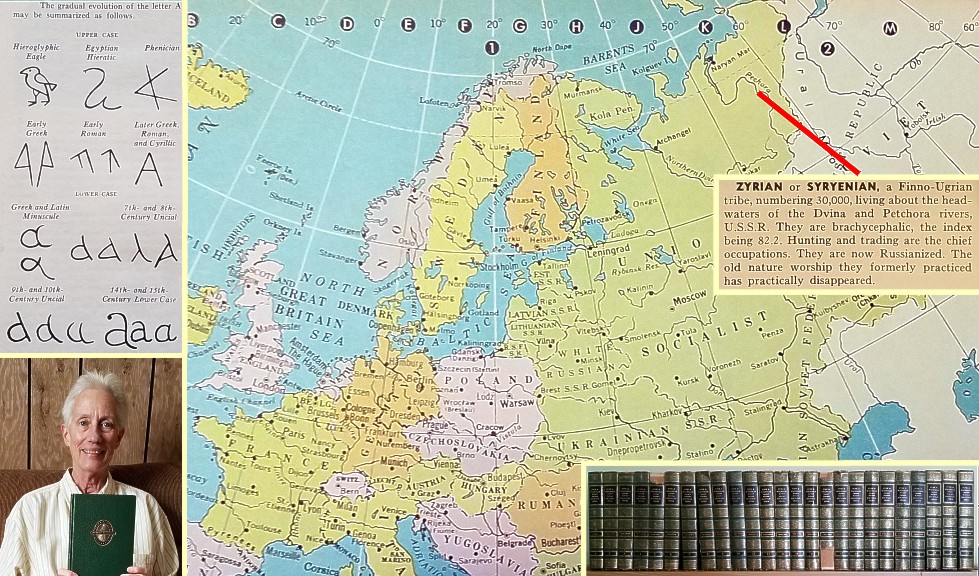Kansas Snapshots by Gloria Freeland - October 1, 2021
"Look that up in your Funk and Wagnalls"
In our five 2021 visits to Wisconsin to clear out husband Art's family home following the late-January death of his brother
Tommy, we've dispatched pickup loads of trash; gathered newspapers, magazines, cardboard, plastic and glass for recycling;
donated car-trunkfuls of clothing, kitchen gadgets, shoes and other items to a local charity; and kept many boxes of
treasures for ourselves, family members and friends.
But after all our previous work, Tommy's 1959-1960 Funk & Wagnalls Standard Reference Encyclopedia set was still sitting on
the otherwise empty shelves. The 25-piece collection consists of dark-green volumes with gold and black words and
designs on the bindings and covers.
I struggle with what to do with books. I love books, particularly older ones with interesting covers or illustrations that
speak to a bygone era. Still, I really don't have shelf space to add more tomes to our home.
What I particularly like about them is they're 8 1/2 x 5 3/4 inches - not like the large, clunky brown Encyclopedia Britannica
books we had when I was growing up. While today's school kids research on Wikipedia or any number of internet sites to find
information on topics from Alaska to Zimbabwe, youngsters of my generation spent a lot of time reading from printed
encyclopedias or other books.
Tommy, who had an insatiable curiosity, once surprised Art by refusing his offer to set Tommy up with internet access. He told
Art that if he had it, he'd spend all day inside searching for information. When Art shared this with me, I thought about the
previous years when Art and I would visit at their mother Donna's home. Tommy frequently joined us and it was common for him
at some point to get up, retrieve one of Donna's red Grolier�s encyclopedias, and begin reading about whatever topic we had
been discussing.
Now I am doing the same thing with his Funk & Wagnalls! I've researched the history of the letter "A" and even learned details
about the Zyrian tribe of the former U.S.S.R. and many topics in between.
While some entries are accurate today, others provide snapshots of what life was like 61 years ago. In 1960, the Union of
Soviet Socialist Republics, or Soviet Union, was still the name of the country that now includes 15 "post-Soviet states" -
Russia, Ukraine, Armenia and 12 others.
The name of my alma mater and the place where I taught journalism for 37 years, was changed to Kansas State University in 1959,
but the Funk & Wagnalls' volume "Judg-Long" still had the school's old name - Kansas State College of Agriculture and Applied
Science.
In 1960, Alaska had been a state for only two years and was home to the tallest mountain in North America. When I was young,
it was called Mount McKinley. But it had been called Denali by many generations before that. It is a traditional Native Alaskan
word for "the tall one," a name it rightly deserved, with the peak being 20,310 feet above sea level. In 1896, a prospector
began calling it "Mount McKinley," in honor of presidential candidate William McKinley. Congress formally recognized the new
name in 1917 - despite the fact that McKinley had never visited Alaska. In 2015, President Barack Obama and Secretary of the
Interior Sally Jewell changed the name back to Denali.
The name Funk & Wagnalls had been etched into my brain during my youth because of two 1960s TV shows: "The Tonight Show
Starring Johnny Carson" and "Rowan and Martin's Laugh-In."
In the former, one of Carson's characters - "Carnac the Magnificent" - was introduced as knowing the answers to questions
that had been placed in envelopes. Carson's sidekick Ed McMahon would say, "I hold in my hand the envelopes. As a child of
4 can plainly see, these envelopes have been hermetically sealed. They've been kept in a mayonnaise jar on Funk and Wagnalls'
porch since noon today."
On "Laugh-In," after some wacky skit had just been completed, host Dan Rowan would appear, look straight into the camera and
say, "Look that up in your Funk and Wagnalls."
I laughed at the references, but I didn't know anything about who they were. But it�s never too late to learn!
Isaac Kaufmann Funk founded the business in 1875 as I.K. Funk & Company. In 1877, Adam Willis Wagnalls, one of Funk's
classmates at Springfield, Ohio's Wittenberg College - now Wittenberg University - joined the firm as a partner and the
name was changed to Funk & Wagnalls Company. During its early years, it produced religious books. But the publication of The
Literary Digest in 1890 marked a shift to emphasizing general-reference dictionaries and encyclopedias. The firm published
The Standard Dictionary of the English Language in two volumes in 1893 and 1895, and Funk & Wagnalls Standard Encyclopedia
in 1912.
Wilfred J. Funk, Isaac's son, was president of the company from 1925 to 1940. His name appears on the copyright page of Tommy's
encyclopedias. Unicorn Press, later known as the Standard Reference Work Publishing Co., obtained the rights to publish the
encyclopedia and, by 1953, that firm began to sell the smaller-sized encyclopedia through supermarkets.
Art said Grolier did the same at the local A&P grocery store. The first volume cost 99 cents. Then, every week or so, a new
volume became available for $1.99, with about 25 books in total.
The last printing of Funk & Wagnalls New Encyclopedia was in 1997. In 2009, the company was acquired by World Book
Encyclopedia.
Today, I go online to find up-to-the-minute answers to questions. But it was fun to reflect on the days when I did research
using my handy-dandy home encyclopedia set. Still, even with modern technology, the one answer that has so far eluded me is what
to do with Tommy's Funk & Wagnalls!
